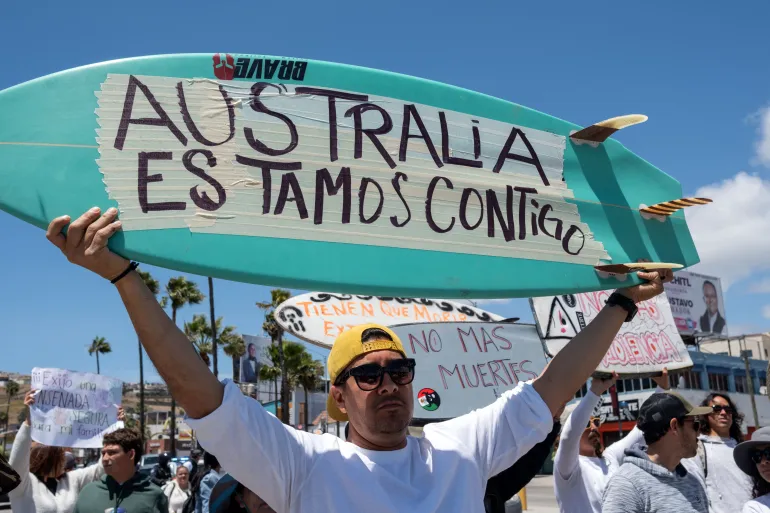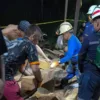Relatives on Sunday identified the bodies of two Australians and an American shot dead in a suspected robbery in Mexico, authorities said, marking a tragic end to the search for the missing surfers.
The corpses were found with bullet wounds to their heads, according to officials in crime-hit Baja California state, suggesting an execution-style triple homicide.
The news confirmed the worst fears of the families and friends of Australian brothers Callum and Jake Robinson, and their American friend Jack Carter Rhoad, who were on a surf trip to Mexico’s Pacific coast.
The trio were believed to have been murdered during an attempt to steal their pick-up truck, state prosecutor Maria Elena Andrade said at a press conference.
The vehicle — which had been burned — was found nearby.
The state prosecutor’s office later confirmed that the bodies had been formally identified as those of the missing surfers.
“The victims’ relatives were able to identify them without the need for genetic tests,” a statement said.
Australian Treasurer Jim Chalmers described the news as “horrendous” and said the “whole country’s heart goes out to all of their loved ones.
“It has been an absolutely horrendous, absolutely horrific ordeal and our thoughts are with all of them,” he said.
Mexico’s foreign minister Alicia Barcena expressed her condolences in a statement, saying that her office “maintained a constant and direct dialogue with the Australian Ambassador to Mexico, Rachel Elizabeth Moseley, and her team, to support the efforts of the diplomatic mission.”
Three suspects, two men and one woman, have been detained on suspicion of involvement in the case, according to Mexican prosecutors.
One of those arrested has a history of violence, drug dealing and robbery, officials said.
Investigators said earlier that the bodies were recovered from a cliff-top shaft in an “advanced state of decomposition.”
Another corpse found at the site had been there longer and was unconnected to the others, officials said.
AFP journalists saw authorities use a pulley system to extract the mud-covered bodies from the shaft on Friday near the town of Santo Thomas, about 30 miles (45 kilometers) southeast of Ensenada.
– ‘Tragic loss’ –
The Australian brothers’ mother, Debra Robinson, had sounded the alarm on a Facebook page for Baja California tourists several days ago, after the young men dropped out of contact.
“Reaching out to anyone who has seen my two sons. They have not contacted us since Saturday 27th April,” she wrote, attaching a poster from friends desperate for news of their whereabouts.
A missing poster shared on social media said Callum Robinson was 33 and his brother Jake was 30. It named their friend as Jack Carter Rhoad, aged 30.
The friends had previously visited Mexico several times without any problems, Andrade said.
Callum Robinson’s Instagram page showed several images from the trio’s Mexico trip: enjoying beers with their feet up in a bar, lazing in a jacuzzi, eating roadside tacos, looking out at the surf.
Six-foot-four (1.93 meters) Callum had played in the US Premier Lacrosse League, which left a message on its website saying the lacrosse world was “heartbroken by the tragic loss” of the trio.
“We offer our hearts, support and prayers to the Robinson and Rhoad Families, as well as all who loved Callum, Jake and Jack,” it said.
Jake Robinson was a doctor in Perth, according to Australian media.
Baja California is known for its inviting beaches, and its resorts are popular with US tourists, partly because of their proximity to the border.
It is also one of Mexico’s most violent states because of organized crime gangs, although cartel activity doesn’t commonly affect foreign tourists.
Dozens of surfers protested in Ensenada on Sunday with messages written on their boards including “beaches, security, freedom, peace” and “no more deaths.”
The case echoes that of two Australian surfers who were murdered and their bodies burned while traveling in the northwestern Mexican state of Sinaloa in November 2015.
Criminal violence in Mexico has claimed 450,000 lives and led to more than 100,000 disappearances since the end of 2006, when the government launched a controversial anti-drug strategy involving the military.
AFP


